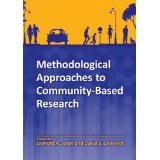“Methodological Approaches to Community-Based Research”

“Methodological Approaches to Community-Based Research”
Edited by Leonard A. Jason and David S. Glenwick
American Psychological Association
Washington, D.C., 2012
‘Formidable’ work challenges reader
Reviewed by James K. Luiselli, Ed.D., ABPP, BCBA-D
eonard A. Jason and David S. Glenwick are highly regarded community psychologists with extensive publication records on topics such as public health interventions, self-help support groups, policy development and primary prevention. In this book, they address research design and application to assist “the community researcher in learning about and actually using relevant cutting-edge methodologies.” Their intended audience is broad, including social and behavioral sciences academicians, mental health professionals and advanced graduate students.
In the introductory chapter, Jason and Glenwick outline several factors that have “given rise to a new generation of social problem analyses and interventions based on the transactions between persons and community-based structures.” Accordingly, they argue for more sophisticated research methodologies which encompass evolving theoretical models and respective analytic methods. They also have a pragmatic emphasis that is intended to stimulate activity among established and emerging researchers.
The 13 chapters in the book were written by recognized experts in the field of community psychology. These chapters comprise four sections that deal with methods for conducting experimental and quasi-experimental studies, grouping data, evaluating change over time and isolating contextual variables. Acknowledging the high scholarship represented in each chapter, most readers will be challenged by the material – this is not a book for casual pursuit at the beach!
For the majority of professionals, I suspect that the chapters with greatest appeal will be those that consider specific community-change strategies and interventions. The discussions about primary, secondary, and tertiary prevention are particularly informative, as are recommendations for adapting research designs to hypothesis-testing and outcome measurement. These chapters are aided by case illustrations and reviews of relevant publications.
A smaller audience will embrace the chapters about quantitative and statistical analysis of data. It is not that the contents are poorly presented or are out of place in the book. Rather, the discourse is complex, covering cluster analysis, hierarchical log-linear models, meta-analyses, regression equations and similar operations.
Without question, this is a formidable book, carefully crafted, insightful, and uniquely focused. As well, it branches into new territory, previously overlooked by community psychology enthusiasts. Yes, you probably will have to read chapters selectively and several times to digest the vast amount of information contained within. Also, there would need to be considerable discussion among like-minded peers and individuals seeking knowledge about this fascinating subject. As such, university faculty and highly motivated students will find the book a valuable resource.
James K. Luiselli, Ed.D., ABPP, BCBA-D, is senior vice president, applied research, clinical training and peer review at the May Institute in Norwood, Mass.
Learn more about the book: Methodological Approaches to Community-Based Research
